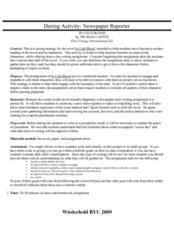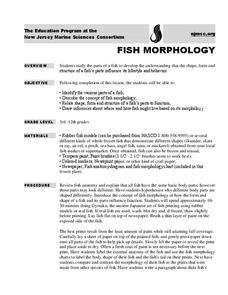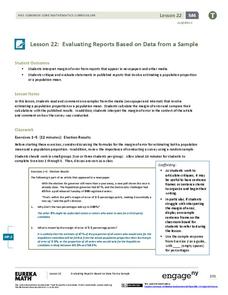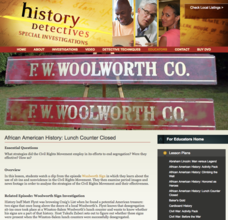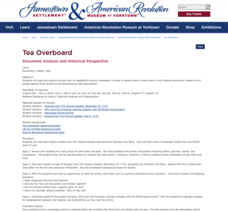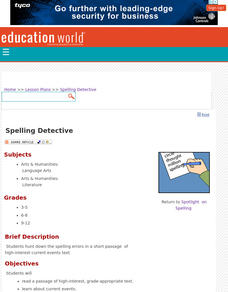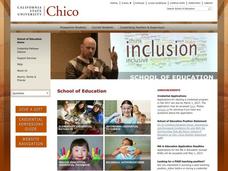Curated OER
ASL: Lesson 15
ASL is fun to learn and now so easy! This is lesson 15 in a series of 30+ lessons of learning or teaching ASL in a comprehensible and strategic way. Use this lesson to reinforce identifying community helpers and conducting an interview....
Curated OER
Opinion through the Ages: Exploring 40 Years of New York Times Op-Eds
What is the role of a newspaper's Op-Ed page? High schoolers explore the New York Times' "Op-Ed at 40," an interactive feature that lets them browse through 40 years worth of op-ed features, and consider the purpose and value of this...
Curated OER
Easy Access: Creating Annotated Versions of News Articles
How can news coverage be made more accessible for teens? Model for your class how to use technology to annotate news stories containing unfamiliar references that hinder their interest in and understanding of a news story. Use the...
Curated OER
In Cold Blood: A During Reading Activity
Following the method used by Truman Capote, class members research a major character from his novel, In Cold Blood, and then conduct an interview with that character. The resulting research is used to craft a newspaper article about the...
Curated OER
Home Living / Daily Living: Dressing for the Weather
What to wear? Help your special needs class make independent choices about what they should wear during various weather conditions. They'll discuss weather-appropriate clothing, dress dolls for the weather outside, and even put on a...
The New York Times
News and News Analysis: Navigating Fact and Opinion in the Times
Help your class understand the difference between fact and opinion by exploring the New York Times homepage and articles. In pairs or small groups, pupils complete a scavenger hunt, answering the provided questions. Next, discuss the...
Newseum
The Medium Shapes the Message
Where do you get your news? Have learners examine four different publications and decide which one they would choose to read on their own time. The resource includes a list of publication types to supply and a worksheet for groups to...
Thomson Delmar Learning
Art Lesson Plans
Bean shaker paintings and coffee grounds mosaics. Melted crayon drawings and raised glue art. Ten art projects for little ones are detailed in a 14-page packet.
Consortium for Ocean Science Exploration and Engagement (COSEE)
Fish Morphology
Life comes in all different shapes and sizes, and fish are no exception. Here, young scientists create fish prints as they learn how specific characteristics allow different species to survive in their particular habitats.
University of the Desert
Fact and Opinion within the Media
How can the media foster cultural misunderstandings? These activities encourage learners to distinguish between fact and opinion in the media
Virginia Department of Education
Practical Problems Involving Decimals
After discussing decimals and "going shopping" in the classroom, young mathematicians are given four practical word problems that require them to estimate their answers, given specific information. The highlight of the instructional...
School Improvement in Maryland
Regulatory Agency
Five governmental regulatory agencies are tasked to respond to market failure. Groups investigate the roles of each of these agencies as well as the social, economic, and political impact of their actions.
Brown University
Following the U.S. Presidential Election
Election years provide the opportunity to evaluate news media as well as the next prospective president. High schoolers read about the same event in several different news sources, varying in type, origin, and political leaning, before...
EngageNY
Evaluating Reports Based on Data from a Sample
Statistics can be manipulated to say what you want them to say. Teach your classes to be wise consumers and sort through the bias in those reports. Young statisticians study different statistical reports and analyze them for misleading...
Scholastic
Lesson Four: The Earth, Layers of Earth
Get your hands dirty with a set of earth science activities! Class members delve into a hard-boiled egg to find the similarities to the earth's layers, create a papier-mâché model of the earth, craft a simulation of the earth's...
Chymist
Landfills and Recycling
Examine the nature of landfills through experimentation. Scholars build miniature landfills and monitor changes over a six-week period. Observations allow individuals to draw conclusions about the different types of trash and their...
PBS
African American History: Lunch Counter Closed
Young historians investigate and evaluate the effectiveness of the strategies the Civil Rights Movement used to end segregation in the United States. After watching an video interview with Carl Matthews and Bill Stevens who participated...
DiscoverE
Sun-Warmed Treats
Treat your class to a fun activity, complete with treats. Groups create a solar oven from a pizza box. They then use it to heat up some food ... that's what an oven is for, after all!
National Endowment for the Humanities
“Read All About It”: Primary Source Reading in “Chronicling America”
Can investigative journalism become too sensationalistic and accusatory, or is it vital for the survival of a democracy? Middle schoolers analyze primary source documents from early 20th-century newspapers as well as Theodore Roosevelt's...
Jamestown-Yorktown Foundation
Tea Overboard
While less well known than the event in Boston, the Yorktown Tea Party was equally decisive in turning community sentiment against Great Britain. To gain an understanding of why the colonists objected to the Tea Act, young historians...
Curated OER
Spelling Detective
Put on your Sherlock Holmes hat and become a spelling detective! Scholars hunt down the spelling errors in a short passage of a high-interest current events text. Here is a great way to develop editing and reading skills.
Curated OER
Math Activity File
Third graders describe the difference between area and volume and also explain how various units of measure relate to one another.
Curated OER
Papier Mache Animals Sculptures
Fourth graders construct papier mache sculptures that emphasize texture, form and color. Each student chooses and constructs a unique papier mache sculpture of a farm animal..
Curated OER
Strong Convictions
How can the rhetorical structure of an editorial help to develop its argument? Use this New York Times editorial to emphasize the importance of structure in a piece of informational text. Adolescent writers then use the editorial as a...
Other popular searches
- Newspapers
- Newspaper Activities
- Current Events Newspaper
- Newspaper Articles
- D Day Newspaper Articles
- Journalism School Newspapers
- Writing Newspaper Articles
- Newspaper Vocabulary
- Parts Newspaper
- World War Ii Newspaper
- Newspaper Grammar Lessons
- Parts of a Newspaper





